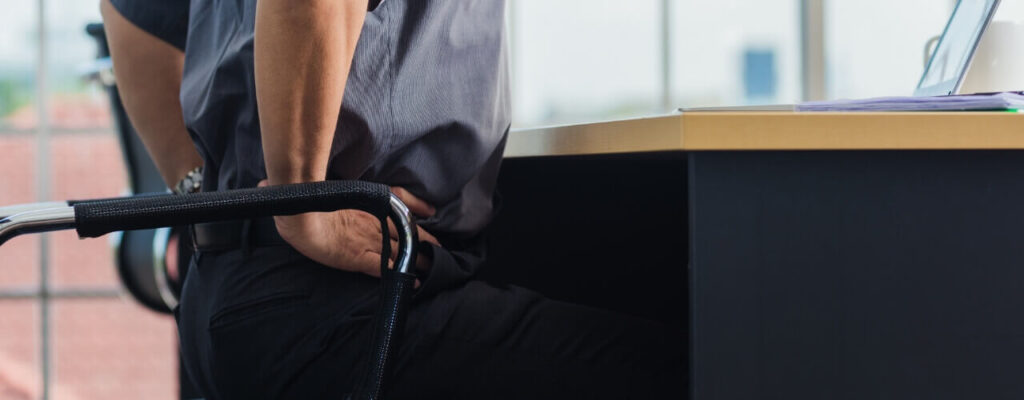Is Poor Posture the Source of Your Back Pain?

Are you constantly forgetting to sit up straight? Do you have shoulder pain after a long day at work or have noticed you’re developing a hunchback? If so, you may have Upper Crossed Syndrome (UCS). This is a fairly common ailment that affects people of all ages!
UCS is a muscle imbalance in the head and shoulders that is common in people who sit at a desk or sit with poor posture for the majority of the day.
As a result, the cervical flexors and lower trapezius muscles (which form a straight line when looking from the side) are weak, while the upper trapezius and pectoral muscles are tight (forming the cross when looking from the side).
This two-edged sword frequently results in a forward head posture, hunched appearance, and shoulder pain. If you believe you have upper-crossed syndrome, contact Apex Physical Therapy in Merrillville, Indiana right away to learn more about how physical therapy can help. We have all the tools necessary to help you heal!
Have you heard of upper-crossed syndrome?
A physical therapist can help with UCS treatment. They can not only eliminate underlying causes, but they can also design a personalized treatment plan to address both your pain level and your symptoms.
When you work with a physical therapist, your treatment will be divided into three parts: stretching the upper trapezius and pectoral muscles, strengthening the cervical flexors and lower trapezius muscles, and training you to make postural adjustments throughout the day to avoid future recurrence.
Stretching
The first order of business for anyone with UCS is to restore the shortened muscles. When one muscle is tightened or shortened, the opposite muscle relaxes, according to Sherrington’s Law of reciprocal inhibition.
To lengthen the upper trapezius and pectoral muscles, your physical therapist will recommend a series of stretches and other therapies such as myofascial release and massage.
Strengthening
Exercises that target the cervical flexors and lower trapezius muscles are simple to perform. The most fundamental is the chin tuck. To begin, lie on your back with your knees bent and head flat on the ground.
Next, bring your chin as close to your neck as possible while keeping the back of your head on the floor and your mouth closed. Hold this position for 10 seconds, 10 to 12 times, keeping your head straight.
Postural Correction
All of your stretching and strengthening efforts will be futile if you don’t address the issue that brought you here in the first place: your posture.
Stand with your back and the back of your head against the wall, and your feet about six inches away. The distance between your neck and the wall should be no more than two fingers’ width. This simple trick is often enough to remind your body of what proper posture feels like.
Consider elevating your desk to create a more neutral seated position. Keep your posture in mind as you text, type on a computer, cook in the kitchen, or drive. To prevent UCS from recurring, train your body to make appropriate adjustments in each of these positions.
Treating Upper Crossed Syndrome is ultimately an investment in your future health. Not only will you look better from a postural standpoint, but your athletic performance will improve as well. Contact your physical therapist today for more information on UCS or to learn more about stretching and strengthening exercises.
Find the relief you’ve been searching for in physical therapy
If you’re experiencing pain from hunching over your desk, physical therapy can assist in determining the source of the pain and developing a treatment plan that works best for you.
A physical therapist can conduct tests to determine the source of your pain and help you improve your posture, thereby relieving your pain.
As stated by the American Physical Therapy Association,
“The physical therapist uses tests and measures to assess an individual’s structural alignment. Optimal posture is a state of musculoskeletal balance and skeletal alignment that may protect the individual against injury or progressive deformity. Responses monitored at rest, during activity, and after activity may indicate the presence or severity of an impairment, activity limitation, or participation restriction.â€
We can assist you if your posture is causing you pain.
Are you ready to start feeling better? Contact Apex Physical Therapy today!
Are you looking for more help with your aches and pains? We can assist!
Contact our office today to set up an appointment with one of our physical therapists and take the first steps toward relief. With physical therapy, you can live a more comfortable life!
